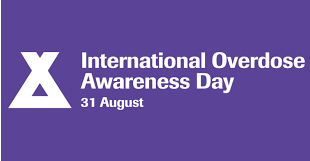HarborPath Marks International Overdose Awareness Day with New Programs Expanding Access to Life-Saving Naloxone
International Overdose Awareness Day, observed annually on Aug. 31, was created to raise awareness of the global health crisis caused by drug overdoses, reduce stigma, remember those who have died and spur discussion about overdose prevention and drug policy.
HarborPath —

International Overdose Awareness Day, observed annually on Aug. 31, was created to raise awareness of the global health crisis caused by drug overdoses, reduce stigma, remember those who have died and spur discussion about overdose prevention and drug policy.
Statistics demonstrate the scope of the problem and the need for effective solutions.
According to the U.S. Centers for Disease Control and Prevention, more than 106,000 people died of drug overdoses in the 12 months ending November 2021. Total annual drug overdose deaths have more than doubled over the past six years and increased 16% in the last year alone, according to CNN.
Opioids account for a substantial portion of total U.S. drug overdose deaths. Data from the National Institute on Drug Abuse found that total overdose deaths involving any opioid – prescription opioids, synthetic opioids other than methadone (primarily fentanyl), and heroin – jumped from 21,088 in 2010 to 68,630 in 2020.
And an increasing proportion of overdose deaths can be traced to illicit fentanyl poisoning. According to Families Against Fentanyl, illicit fentanyl is responsible for 175 deaths every day and has killed more than 200,000 Americans since 2015. As of January 2022, illicit fentanyl was responsible for nearly two-thirds of all drug-related deaths in the United States last year.
One way to stem the tide of overdose deaths? Increased access to the life-saving drug Naloxone.
An effective tool in saving lives on the front lines of the opioid epidemic, Naloxone is increasingly being carried by law enforcement and first responders. Additionally, many states have increased access so family members, friends or those likely to come into contact with an overdose can more easily obtain the life-saving drug.
Founded a decade ago to deliver life-saving medication to the uninsured free of charge, HarborPath continues to focus on overcoming barriers that prevent people from obtaining critical medications. That effort has expanded to include getting Naloxone to where the need is greatest.
In June, HarborPath announced a partnership with Operation UNITE, a non-profit organization serving 32 counties in Southern and Eastern Kentucky. As part of the agreement, HarborPath funded a multi-year, $60,000 grant that will go towards hiring a prevention projects coordinator to increase access to Naloxone in the region, which has been devastated by the ongoing opioid epidemic.
Additionally, HarborPath announced in July that it had selected FFF Enterprises as its exclusive distributor for Naloxone to help states combat the opioid epidemic. As part of this effort, HarborPath will deploy Naloxone through nonprofit organizations, county health departments, university health centers, or directly to consumers. It is currently working with federal, state, and local officials along with nonprofit organizations to identify the customized distribution and operational approaches capable of delivering the best outcomes.
We’re encouraged by organizations across the country working to combat the stigma of overdoses and create an infrastructure of lifesaving care and medicine. One such example is the Colorado Naloxone Project, working to equip hospitals across the state with naloxone. The Colorado Naloxone Project is a terrific example of how other states and nonprofits can create programs to save lives and loosen the group of the overdose crisis.
HarborPath remains dedicated to offering patient-centric solutions for unmet medical needs, especially for the most vulnerable in our communities. Our recently announced programs increasing Naloxone access are an important expansion of our mission that we hope will make a significant positive impact in battling America’s current opioid epidemic.



